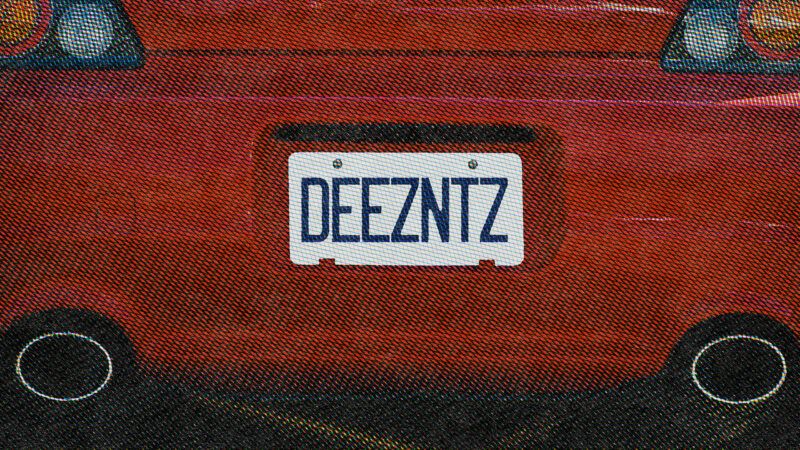Maine's Ban on 'DEEZNTZ' Might Be Unconstitutional
The state's new rules on vulgar vanity plates could amount to unconstitutional viewpoint discrimination.

Maine is bringing an end to its brief experiment with vanity plate anarchy.
Officials have proposed a new set of regulations limiting the vulgar messages motorists can put on their vehicle plates. But free speech experts say the state's rules might go too far.
"The First Amendment protects your right to have any bumper sticker you want, but it doesn't force the state to issue official registration plates that subject children in our communities to obscenity or profanity," said Maine Secretary of State Shenna Bellows in a statement yesterday when announcing new draft regulations.
The new rules ban registration plates bearing obscene or profane messages as well as those that might cause or encourage violence. Plates that use derogatory terms about race, gender, and sexual orientation are also prohibited, as are those that use slang terms or falsely imply affiliation with a government agency. Any terms that connote "genitalia" or relate to sexual acts are banned too.
These draft regulations will put an end to Maine's heretofore libertarian approach to vanity plates that's prevailed since 2015.
That's when then-Secretary of State Matt Dunlap dropped the Maine Bureau of Motor Vehicles' practice of reviewing and rejecting vanity plate applications with offensive words, reports The Drive. Dunlap expressed concern that the practice wouldn't withstand court scrutiny after the New Hampshire Supreme Court struck down a similar arrangement in that state.
Since Dunlap's liberalization, Mainers have zealously and creatively exercised their new freedom.
An Instagram account dedicated to tracking some of Maine's vanity plates shows the messages range from the innocuous ("CARROTS") to the obscene ("VAG LVR," "ILUVBJ"). This 2018 article from Jalopnik compiles some of the better ones out there.
Certainly, one might question the wisdom of spending $63,000 on a Tesla only to adorn it with a "FARTZ" vanity plate. But no one said freedom was pretty.
Nevertheless, the Maine Legislature—responding to complaints about some of the more risqué plates floating around the state—passed a law last year reimposing decency standards on vanity plates. The law also gives the secretary of state the power to refuse to issue obscene plates and recall ones that have already been issued.
According to the Associated Press, Maine has issued some 120,000 vanity plates, meaning about one in 10 state residents has one. Bellows, per Maine Public Radio, says that about 400 plates currently in circulation would not meet the state's new standards.
But Maine's vanity plate rules might not meet the U.S. Constitution's standards, says Joshua Thompson, an attorney with the Pacific Legal Foundation (PLF). In particular, he says that Maine's broad ban on derogatory words and slang terms is likely unconstitutional viewpoint discrimination.
A government-issued license plate would be considered a "limited public forum," says Thompson, where officials do have some power to limit the kinds of expression that can happen. But "speech restrictions in limited public forums have to be reasonable. One thing that's per se unreasonable are viewpoint discrimination," he tells Reason. "When you say something can't be offensive or can't be derogatory, you are preferring the view of nonoffensiveness over offensiveness."
In 2020, Thompson and PLF challenged the California Department of Motor Vehicles' similar ban on vanity plates that "may carry connotations offensive to good taste and decency" on behalf of four motorists who'd had their plate applications rejected.
One of their clients was a gay man who had requested a vanity plate saying "QUEER," which he saw as a way of reappropriating the term from being a slur. The DMV reasoned it was offensive and rejected his application.
Ultimately, a judge in the U.S. District Court for the Northern District of California sided with PLF and struck down California's offensive standards as unconstitutional viewpoint discrimination.
Maine's restrictions on plates that are "profane" or "obscene" are written more carefully and would likely pass constitutional muster, says Thompson. But a lot also depends on how the rules are applied. Rules that give individual state officials a lot of discretion in deciding what counts as obscene raise the odds of individual vanity plates being rejected on unconstitutional viewpoint discrimination grounds.
The draft rules released by Bellows yesterday would establish a Vanity Plate Review Committee to vet applications. People who have their applications rejected would have the opportunity to file an appeal. Members of the public could also report license plates that they say don't meet the new standards.
That would all seem to leave plenty of room for unconstitutional license plate censorship. One wonders if it's worth so much of the government's time just to prevent the issuance of a "DEEZNTZ" plate.
Bellows' regulations are just draft rules at the moment. A public hearing on them will be held later this month.
